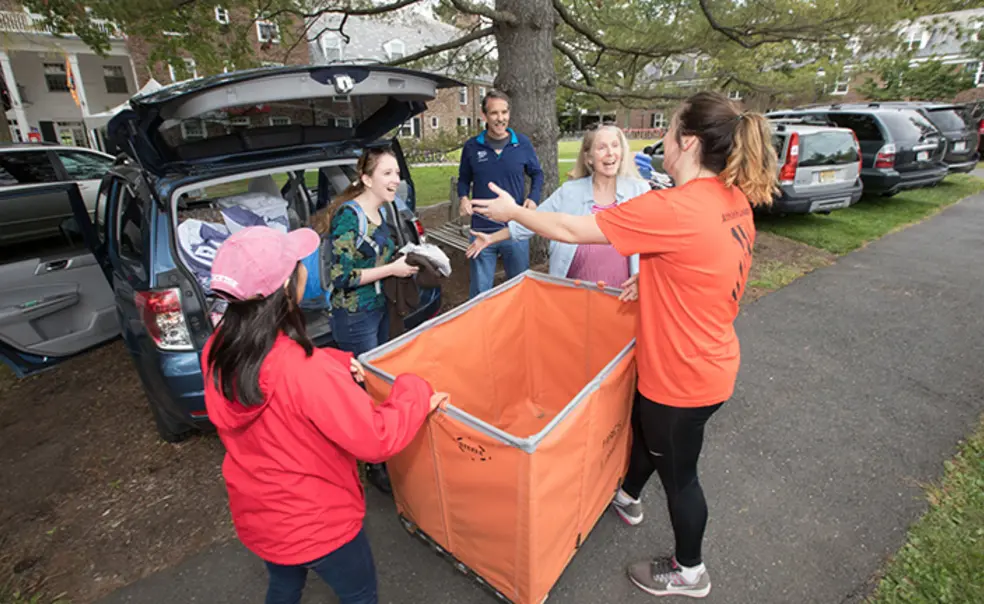The Whole Student: College Dropoff 101
“You, the parent of a college freshman, are not supposed to get your kid acclimated. ... You are supposed to leave.”
As an adviser working with pre-meds and athletes (sometimes both at once), I am no stranger to the anxiety that can accompany the pursuit of excellence: Am I good enough? What if I disappoint my parents, coach, teammates? I can usually read the questions on their faces even when they don’t ask them out loud.
I’m sure I was asking myself these kinds of questions as a high-strung high school student myself, reading books with titles like, Getting In, as if they contained secret recipes. Sometime before I left for Princeton, my dad posed a more important question to me on a sticky note he placed on my desk: “Got in. Now what?”
“Now what?” is a great question to ask when first-year college students are packing and nervous parents are trying not to count the days until drop-off. Parental anxiety levels are often even higher than the corresponding kid version. First-year students will have no end of professionals and near-peers to answer questions, point in directions, and quell most fears. But I know that no nest has ever felt so empty as a new empty nest, and I know the feelings can be tough to manage.
For example, take the mom who wrote a viral post about sleeping over in the dorm on her daughter’s first night at college. “I was able to get her acclimated,” she wrote. “We hung out with all of her friends, we met the RA, we ate in the dining hall together.” But, you, the parent of a college freshman, are not supposed to get your kid acclimated. “We” are not supposed to hit these milestones together. You are supposed to leave.
I’d like to offer three tips for those about to drop off, whether you are dropping off at a place you went to once upon a time, or a school you only discovered via the Common App.
Breathe. You may think this is beyond obvious and you don’t need the reminder, but you do because it is often overlooked and it works. I have sat with students immersed in panic, tears, or the silent confines of their hoodie. When I invite them to take one breath, they are almost immediately in a better place. A place where they can think, talk, move, or just sit with a hard feeling, and realize that they can survive it. You will want this tool when you get the first falling-apart call or haven’t heard from your kid in too long. Just. Breathe. You will be better for it, and so will your kid.
Let it be theirs. Much ink has been spilled over the past few years about the consequences of overparenting and the benefits of reigning in the inclination to fix everything. If you spent a lot of last year talking about where “we” are applying, the time is now to set the record straight. Your kid applied. Your kid is enrolled. Your kid can do this, and you can separate. Let them figure out where the mailroom is. Let them set their own alarm and miss the class when they forget. Let them not know what they want to take next semester. Ask if they’ve explored the counseling center or gotten to know a dean they like. It’s part of what needs to happen. Everything that is about to happen — the good, bad, ugly — is part of the education you want them to have. Do not email the professor about their B. Do not call the coach about playing time. Really. And for goodness sake, do not sleep over on the first night, even if your wish to do so comes from love.
Keep your cool. Part of what makes college students feel overwhelmed is thinking everything is riding on their success, or that everyone else is killing it. One of the best gifts you can offer is perspective. When their GPA, their ego, or their heart take a hit, and in big or small moments of validation and triumph, you will do the most by listening as their empathizers. Everything is part of a process, part of their story, and ultimately part of preparing for life beyond university gates. What they do at school can be transformational and inspiring, but every day won’t be amazing. It’s OK. Let them know you love them even on the ones that don’t make it to Insta. Especially those.
Watch and listen to yourself, and to your kid. Let them go, touching base on a schedule that gives them space while letting them know you are there when they want to hear your voice. Lean into friends who have been through it. Call your roommates and laugh about ridiculous things you still remember or can’t forget. Breathe. It’s not easy, I know. They can do this. So can you. You’ve got this, P’28. Right?
Also, share the College Mental Health Toolkit.
Jess Deutsch ’91, EdM, LSW is an education adviser in Princeton, N.J. Her career and current practice focus on promoting well-being in the pursuit of higher education. She writes “The Whole Student” for PAW about student mental health at Princeton.












No responses yet